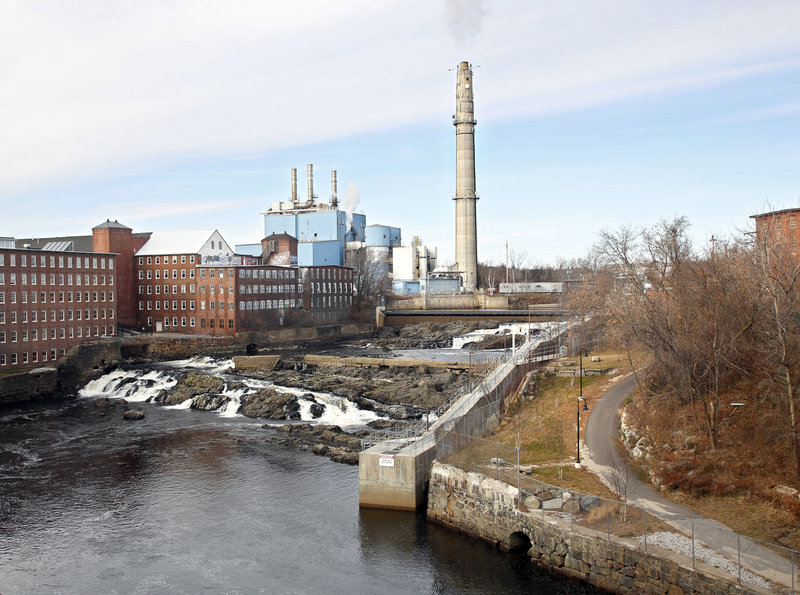BIDDEFORD — Sealing a historic deal that many hope will bring new life to a downtown dominated by a trash incinerator for the past 25 years, Biddeford purchased the Maine Energy Recovery Co. property Friday.
“It’s the beginning of an incredible new era for the city,” said City Manager John Bubier as he signed the sale documents at City Hall, a block from the incinerator and its towering smokestack.
Residents and business owners have complained since MERC opened in 1987 about the plant’s smell, the rumble and odor of trash trucks, and smoke from the stack.
The purchase agreement allows the waste-to-energy incinerator to keep burning trash until the end of this year, then calls for its demolition by Casella Waste Systems, which sold MERC to the city.
Mayor Alan Casavant said the plant has been “a big blue obstacle” to redevelopment of the city’s former textile mills into residential, retail and manufacturing spaces.
Despite an increase in occupancy in the past several years, much of the mill space remains empty, he said, with investors hesitant to move to a city once dubbed “Trashtown USA.”
The purchase marks a turning point for Biddeford and will help stimulate economic development in its downtown and mill district, the mayor said.
“We’re changing the paradigm, we’re changing the stereotype and we’re moving forward.”
The City Council voted in July to buy the MERC property for $6.65 million from Vermont-based Casella Waste Systems, which had decided to close the plant and shift operations to its other waste handling facilities, including one that’s under construction in Westbrook.
Casella is seeking permission to bury more trash at the Juniper Ridge Landfill in Old Town. That issue is pending with the state Department of Environmental Protection and will be decided next year.
Casella gave 60-day layoff notices in November to its 75 employees at MERC and said operations in Biddeford will end by Dec. 31.
The demolition will spare only the smokestack, which holds cellphone towers that generate revenue. The city will use that revenue to help pay for the purchase.
City and company officials delayed the sale until the state formally approved a plan to clean up contamination at the site. It appeared earlier this week that the closing would be delayed until next week, but the cleanup was approved by the DEP late Thursday, clearing the way for Friday’s closing.
Environmental tests done on the site revealed dioxins and polychlorinated biphenyls. Casella will pay to remove contaminated soils and underground and above-ground storage tanks. The cleanup also will address any asbestos, lead-based paint and materials containing PCBs found during the demolition.
Joanne Twomey, a former Biddeford mayor who fought before and during her administration to close MERC, said Friday that she has concerns about the findings from the environmental tests.
She said she doesn’t think the city should have paid more than $6 million for contaminated land.
“I can’t be jumping up and down today,” she said. “Today is a mixed bag. I’m happy they’re going to be gone, but I feel MERC got the best deal.”
While the property is being cleaned up, the city will plan the future of the 8.4-acre site on the Saco River, just off Main Street.
Daniel Stevenson, the city’s economic and community development director, said the city will commission a feasibility study for the property. His office has already fielded calls from investors and developers who are interested in the site, he said.
Delilah Poupore, executive director of the nonprofit Heart of Biddeford, which is working to revitalize the downtown, said the purchase of the MERC property has already increased interest in new businesses, restaurants, and arts and cultural events.
Since the sale was announced, Heart of Biddeford has received calls from people as far away as Washington state who are interested in learning more about what the city has to offer, she said.
“People have been working a long time to help Biddeford rebuild,” she said. “It seems like all the pieces are coming together.”
Mark Johnston, the mayor of neighboring Saco and a longtime vocal opponent of MERC, said the twin cities will benefit economically, and from an improved quality of life.
“People will enjoy walking downtown without pinching their noses because of the odor,” he said. “This is a great day for both Biddeford and Saco residents. We lost two decades of economic development” because of the incinerator.
As Bubier signed the sale documents, City Council President Rick Laverriere said the purchase is “one of the best things done under my watch.”
“We will no longer be known as a stink town,” he said. “There’s no looking back now. It’s full steam ahead.”
Staff Writer Gillian Graham can be contacted at 791-6315 or at:
ggraham@mainetoday.com
Twitter: grahamgillian
Send questions/comments to the editors.





